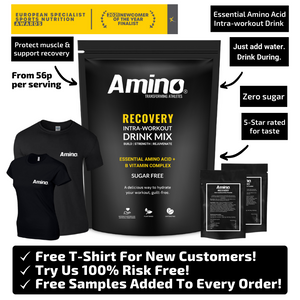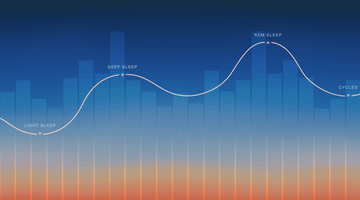Intermittent fasting (IF) has taken the wellness world by storm, but can it truly help you shed pounds?

While IF offers potential benefits like boosted fat burning and improved insulin response, it's not a magic bullet. Training fasted can lead to muscle loss and less enjoyable workouts.
This blog dives into the science behind IF and weight loss, exploring:
Ready to unlock the truth about IF? Dive in and see if it's the right fit for your weight loss journey!
What is intermittent fasting?
Intermittent fasting refers to restricted eating. Unlike other diets, it does not prescribe what to eat, but when.
There are several different methods for this. A popular intermittent fasting schedule merely extends the period of fasting you have while you sleep. This is known as intermittent fasting 16/8. It means that you fast for 18 hours, then condense your eating period into 8 hours.
For instance, you breakfast at 9am, eat your last meal at 5pm, and then don’t eat again until 9am the following day. This schedule can be altered to 18/6 or 20/4, depending on your preferences.
Another popular regime is the 5/2 method. In this intermittent fasting schedule, you eat normally for 5 days a week, but choose 2 non-consecutive days to fast. On the fasting days, you limit your calorie intake to between 500 and 800 calories.
How your body uses energy while fasting and exercising?
Imagine your body as a high-performance machine, constantly needing fuel to function. Its preferred fuel? Glucose, the simple sugar derived from carbohydrates. This readily available energy source keeps your blood sugar levels in check and powers your daily activities.
But what happens when the "glucose tank" starts running low? Enter the body's backup reserve: glycogen. Think of it as stockpiled glucose stored in the liver and muscles, with a whopping 80% residing in your muscles [1, 2]. However, there's a catch: muscle glycogen can't be directly released into the bloodstream like its liver counterpart.
So, how does the body maintain energy during fasting (like overnight) or low-intensity exercise (think leisurely walks)? It taps into the readily available liver glycogen while your muscle glycogen remains undisturbed [1]. Once liver glycogen starts dwindling, the body cleverly switches gears. It breaks down fat tissue, releasing fatty acids into the bloodstream. These fatty acids become the primary fuel source for your muscles, especially during low-intensity activities.
But what about that impressive muscle glycogen storage? It's not just sitting there! During high-intensity exercise (think heavy weight lifting or pushing yourself to 75-80% of your maximum heart rate), your muscles switch to a "carbohydrate-prone" metabolism [1]. This means they prioritize glucose as fuel, and it takes roughly 60-90 minutes of intense training to deplete those muscle glycogen reserves. Interestingly, muscle fatigue can set in even before complete depletion!
This fascinating interplay between glucose and fat as fuel sources highlights the body's remarkable ability to adapt and utilize different energy reserves based on your activity level.
Does intermittent fasting work?
Diet plans for intermittent fasting are primarily aimed at helping the follower to lose weight. Although more in-depth research needs to be done, it does seem that intermittent fasting helps followers to shed the pounds.
One systematic review of 27 intermittent fasting trials found that weight loss of 0.8-13% was achieved.
One of the most obvious reasons for this is that it reduces your overall calorie intake. Provided you don’t binge during the times you’re allowed to eat, you will be eating less.
But dig a little deeper and it is clear that intermittent fasting also helps weight loss because of its wider effect on our bodies.
For instance, when we fast, our bodies alter our hormone levels. This makes it easier to access the fat that we have stored. This means that your body will switch its source of energy from glucose, which is stored in the liver, to ketones, which are stored in fat. By forcing your body to switch its source of energy to ketones, you can help your body to shed fat and lose weight.
This change in hormones has also been shown in some studies to ratchet up the basal metabolic rate, which means you will burn energy faster. In fact, some research has found that short-term fasting may be able to increase your metabolic rate by 3.6-14%.
What are the other intermittent fasting benefits?
Restricting your eating times certainly seems to have a positive impact on weight, but there are also other positive intermittent fasting results.
Some research (predominantly animal-based) has found that intermittent fasting has led to an increase in a brain protein known as BDNF (brain-derived neurotrophic factor). This protein effectively acts like a kind of fertiliser for brain cells, helping them to grow and stay healthy. By increasing the amount of this protein, you could therefore boost your brain function and reduce the risk of conditions such as Alzheimer’s and Parkinson’s Disease.
By not eating, insulin levels will also dip. This can improve sensitivity to insulin and increase glycaemic control. More research needs to be done, but this could prove to be helpful to those with diabetes.
Other reported benefits include reduced inflammation and the reduced concentration of cholesterol.
What to eat during intermittent fasting?
As we said earlier, fasting diets focus on the timing of your meals rather than the meals themselves.
However, this shouldn’t give you an excuse to eat whatever you want. It’s important to eat nutritious and diverse food when you’re not fasting to ensure your body gets everything it needs to stay healthy.
And if you’re strength training, you will need plenty of protein to keep your muscles strong. A 2011 study revealed that intermittent fasting causes less muscle loss than regular calorie restricted diets. However, you will still need to support the maintenance and growth of your muscles to prevent this from happening.
A diet plan for intermittent fasting should therefore include animal and plant protein, such as meat, eggs and seeds. Nutrient dense carbs such as brown rice, oats, quinoa, lentils, black beans are also a good idea, as are good fats such as those found in avocados. Mix this in with plenty of fruit and vegetables.
To support your training while following an intermittent fasting diet, you can also enjoy our amino acid supplements. With zero sugar with ultra-low calories, they are ideal sources of essential amino acids (EAAs) without using up precious calorie allocations. These amino acids will help to support your muscle growth and recovery. Take a look at our pre-workout drink FOCUS and our intra-workout drink RECOVERY to find out more.
What should you be mindful of before adding fasted exercise to your routine?
Intensity Matters: When it comes to fasted exercise and reaping metabolic benefits, low to moderate intensity seems to be the sweet spot [4, 5]. Studies haven't shown much benefit from pushing yourself too hard while fasted, and some even suggest it could hinder performance [3].
Strength training can still be effective while fasted, with one study showing decreased body fat and improved blood sugar control in resistance-trained men who lifted weights fasted [6].
Timing is Crucial: Combining fasting with intense exercise or inadequate post-workout recovery can lead to muscle breakdown (catabolism) as your body struggles for energy [7]. Some studies suggest combining fasting with strict calorie restriction can lead to more muscle loss compared to fasting alone [7]. The research on muscle loss with fasted exercise is mixed, with some studies showing a decrease, and others showing no difference [3, 4, 6].
Individual Considerations: It's important to consider that most research focuses on male athletes, making it difficult to say definitively how fasted exercise affects other groups [3, 4, 6]. Emerging evidence suggests women may respond differently to fasted exercise due to hormonal fluctuations that can impact menstruation [8].
Can anyone follow an intermittent fasting diet?
Fasting certainly seems to come with lots of benefits. However, it is not suitable for everyone. If you have hormonal imbalances or diabetes, it is not recommended.
It should also not be followed by women who are pregnant or breastfeeding. Anyone with a low BMI or a history of eating disorders should also avoid this type of diet, unless under the direct guidance of a medical practitioner.
ENJOYED THIS ARTICLE?
SOURCES
- [1] https://www.ncbi.nlm.nih.gov/pmc/articles/PMC3248697/
- [2] https://nutritionandmetabolism.biomedcentral.com/articles/10.1186/s12986-015-0055-9
- [3] https://pubmed.ncbi.nlm.nih.gov/32408718/
- [4] https://www.ncbi.nlm.nih.gov/pmc/articles/PMC6983467/
- [5] https://www.sciencedirect.com/science/article/abs/pii/S027153172400006X
- [6] https://pubmed.ncbi.nlm.nih.gov/27737674/
- [7] https://pubmed.ncbi.nlm.nih.gov/34135111/
- [8] https://www.sciencedirect.com/science/article/abs/pii/S2451965019300420
- [9] https://pubmed.ncbi.nlm.nih.gov/32060194/
- [10] https://www.healthline.com/nutrition/intermittent-fasting-guide
- [11] https://www.nia.nih.gov/news/research-intermittent-fasting-shows-health-benefits
- [12] https://www.ncbi.nlm.nih.gov/pmc/articles/PMC5913738/
- [13] https://pubmed.ncbi.nlm.nih.gov/21410865/
- [14] https://www.sciencedirect.com/science/article/pii/S1568163716302513






